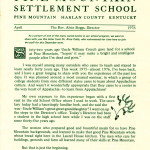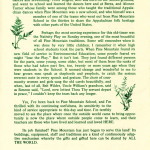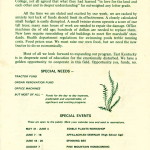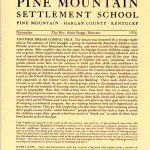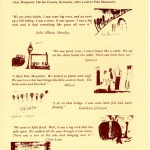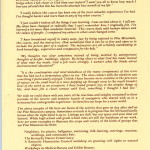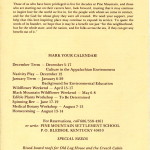Pine Mountain Settlement School
Series 17: PUBLICATIONS PMSS
Notes 1976
April and November
NOTES – 1976
“Notes from the Pine Mountain Settlement School”
April and November 1976
GALLERY: NOTES – 1976 April
I’m terribly moved to see the place where once the outside world came to bring opportunity is now the place where outside people come to learn, and their teachers are those who have lived and learned and loved HERE.- Dr. Alice Cobb
- NOTES – 1976 April, page 1. [PMSS_notes_1976_apr_0011.jpg]
- NOTES – 1976 April, page 2. [PMSS_notes_1976_apr_0021.jpg]
- NOTES – 1976 April, page 3. [PMSS_notes_1976_apr_0031.jpg]
- NOTES – 1976 April, page 4. [PMSS_notes_1976_apr_0041.jpg]
TAGS: NOTES – 1976 April, Alice Cobb, seminar, mountain culture, School Office, Sarah Bailey, weaving, Jess Patterson, dulcimer, William Hayes, Brother Browning, Elisha’s Woods, camping, Afton Garrison, Harry Caudill, Titus Boggs, Welfare Department, Community Council, Edna Ritchie Baker, Singing Family of the Cumberlands, dancing, set-running, Peter Rogers, Alonzo Turner, Nativity Play, Brit Wilder, Nancy Sather, Berea College, expenses, tractor fund, organ renovation fund, special needs, special events
TRANSCRIPTION: NOTES – 1976 April
P. 1
NOTES FROM THE
PINE MOUNTAIN
SETTLEMENT SCHOOL
PINE MOUNTAIN * HARLAN COUNTY * KENTUCKY
April The Rev. Alvin Boggs, Director 1976
As a picture of one of the many varied events in our school program, we want to share with you this letter from Dr. Alice Cobb, who volunteered her time here to join the staff for this December term.
Sixty-two years ago Uncle William Creech gave land for a school at Pine Mountain, “hopin’ it may make a bright and intelligent people after I’m dead and gone.”
I was myself among many outsiders who came to teach and stayed to learn nearly forty years ago. This week 1975 — almost 1976, I’ve been back, and I have a great longing to share with you the experience of the past ten days. It was planned around a most unusual seminar, in which a group of college students from nine different states came to learn about Appalachian culture. And wasn’t it wonderfully appropriate that they came to a center in the very heart of Appalachia — to learn from Appalachians!
[Image: Small drawing of a fern.]
My own exposure to this experience began with a first visit to the old School Office where I used to work. The secretary today had a hauntingly familiar look, and she said she was — Uncle William’s great-great-granddaughter! I went on up the steps to the Director’s office. Today’s Director had been a student in the high school here while I was on the staff some thirty-five years ago.
The women who prepared good and bountiful meals for us have Pine Mountain backgrounds, and learned to make that good Pine Mountain whole wheat bread right here in the Laurel House kitchen. The men who care for buildings, grounds and farm all learned many of their skills at Pine Mountain.
But that is just the beginning.
Sarah Bailey, who came to tell these college students from outside the area about spinning and weaving, and to demonstrate old mountain crafts, lives five miles from our school. In my time Sarah used to ride in at Christmastime on muleback with wreaths of holly hung on both sides of the mule. Today she teaches people all over Kentucky to spin and weave and work with corn shucks.
P. 2
One of the seminar students wanted to make a dulcimer. His teacher was Jess Patterson, whose whole family, as students or as staff members, have connections with the School in all phases of its history.
The County Agent who came over the mountain to tell our seminar about land use in the area grew up in an adjoining county. The Director of Reclamation for East Kentucky, who came to tell us about the problems of strip mining and led our expedition to a reclaimed mine site, was William Hayes, a student at Pine Mountain when I was here, who stayed on to become director of the farm program and teacher of farming for seventeen years, and later worked in various capacities with the forestry service.
An important experience was a meeting at the local Pentecostal church. Brother Browning, the preacher, “gave out” a special church meeting for our group, and a faithful crowd from his flock came to sing and to pray and tell us how they thought about religion, and why. The group from nine states “yonside” learned a good deal that evening about a whole dimension of religion that they had not thought much about before. The preacher? Born and bred right here on Pine Mountain.
An overnight camping trip to Elisha’s woods, and the study of trees, plants and wildlife under the leadership of our staff member, Afton Garrison, a native of the next county, with a lifelong intimate knowledge of the East Kentucky forests, and a genius for sharing his insights, was a revelation to many in the group. One young man exclaimed, “I’ve waited all my life to meet someone like him!”
One day the whole crowd rode over the blacktop road that goes through where the Line Fork woods used to be, all the way to Whitesburg (incredible but true, full of pot holes to be sure, but nonetheless, a black- top). There we talked with Harry Caudill for three hours. You will remember him as author of “Night Comes To The Cumberlands,” a native of this Appalachia and probably better informed on this region than any living person.
One evening the Director’s son, Titus, told us about the problems and opportunities for poor people through the Welfare Department where he is employed. We pondered whether the system is making paupers of a sturdy and self-reliant people. But his father, Alvin Boggs, told us about the community development program in this valley, and the work done by the local Community Council for the enrichment of life in the area.
Another memorable evening Edna Ritchie Baker and her husband drove over to sing ballads and play the dulcimer for us. Nearly everyone in…
P. 3
…the reading world here knows about “The Singing Family of the Cumberlands,” but I wonder how many people know that some of that singing family were once Pine Mountain students [Kitty Ritchie, May Ritchie]. The music kept us enchanted, and we let her go reluctantly when it was time to move to the old School House for a folk dance party. The leaders and teachers of the country dances and set-running? Peter Rogers, who was born on the School grounds, and went to school and learned the dances here and at Berea, and Alonzo Turner whose family were among those who taught the traditional Appalachian dances when Pine Mountain was a new school, and who himself was a member of one of the teams who went out from Pine Mountain School in the thirties to share the Appalachian folk heritage with other parts of the United States.
[Image: Small sketch of a fern.]
Perhaps the most moving experience for this old-timer was the Nativity Play on Sunday evening, one of the most beautiful of all Pine Mountain traditions. Some will remember when it was done by very little children. I remember it when high school students took the parts. When Pine Mountain found its new field of service in Environmental Education, some people feared we might “lose the Play.” But it isn’t lost. They just found different persons for the parts, some young, some older, but most of them from the ranks of those who had taken part five, ten, twenty or more years ago when they were students in the School. It seemed strange and wonderful to me to hear grown men speak as shepherds and prophets, to catch the serious reverent note in every speech and gesture. The choir of community women and girls sang the old carols beautifully, and when, last of all, Brit Wilder, Uncle William‘s grandson, said as Simeon said, “Lord, now lettest Thou Thy servant depart in peace,” I couldn’t keep the tears back any longer.
[Image: Small sketch of a plant.]
Yes, I’ve been back to Pine Mountain School, and I’m thrilled with its continuing usefulness, its sensitivity to the kind of service appropriate to this day and time. I’m terribly moved to see the place where once the outside world came to bring opportunity is now the place where outside people come to learn, and their teachers are those who have lived and learned and loved HERE.
Its job finished? Pine Mountain has just begun to serve this land! Its buildings, equipment, staff and traditions are a kind of continuously adaptive mechanism whereby the gifts and gifted here can be shared by ALL THE WORLD.
ALICE COBB
[Image: Small sketch of a plant.]
P. 4
The January term, which ran for three and a half weeks, had a different topic. It attracted students from many states, many disciplines. Again a generous Board member, Nancy Sather, gave her time to work out details of curriculum and carry a considerable share of the teaching load. Its topic was background for environmental education. It was accredited by Berea College, yet all agreed that what they had learned “in love for the land and each other and in deeper understanding” far outweighed any letter grade.
All the time we are elated and excited by our work, we are racked by anxiety lest lack of funds should limit its effectiveness. A closely calculated small budget is easily disrupted. A small twister storm uproots a score of our tall trees; many man hours of work are needed to repair the damage. Office machines die of old age; hundreds of dollars are needed to replace them. New laws require remodeling of old buildings to meet fire marshalls’ standards. Health department regulations for swimming pools treble running costs. Food prices soar. We must raise our own food, but we need the new tractor to do so economically.
Most of all we look forward to expanding our program. East Kentucky is in desperate need of education for the emotionally disturbed. We have a golden opportunity to cooperate in this field. Opportunity yes, funds, no.
SPECIAL NEEDS –
TRACTOR FUND
ORGAN RENOVATION FUND
OFFICE MACHINES
BUT MOST OF ALL – Funds for the day to day expenses, predictable and unpredictable, of significant and exciting programs.
[Image: Small sketch of a plant.]
SPECIAL EVENTS
These are open to the public. Mark your calendar now and send in reservations.
MAY 31 – JUNE 4 EDIBLE PLANTS WORKSHOP
JUNE 7 – 18 APPALACHIAN SEMINAR (High School Age)
JUNE 18 – 20 SPINNING BEE
AUGUST 7 PINE MOUNTAIN HOMECOMING
AUGUST 16 – 20 MEDICAL BOTANY WORKSHOP
SEPTEMBER 4 FAIR DAY
OCTOBER 15 – 17 FALL COLOR WEEKEND
DECEMBER 12 NATIVITY PLAY
ENQUIRE ABOUT DECEMBER AND JANUARY TERMS BY OCTOBER.
GALLERY: NOTES – 1976 November
Sometimes so much is in progress that the left hand hardly knows what the right hand is up to.
- NOTES -1976 November, page 1. [PMSS_notes_1976_nov_0011.jpg]
- NOTES -1976 November, page 2. [PMSS_notes_1976_nov_0021.jpg]
- NOTES -1976 November, page 3. [PMSS_notes_1976_nov_0031.jpg]
- NOTES -1976 November, page 4. [PMSS_notes_1976_nov_0041.jpg]
TAGS: NOTES – 1976 November, special education, Girl’s Industrial Building, Preston Lewis, Lane Lewis, tractor, sorghum, cattle, Omer Lewis, farm, repairs, work camps, interns, Rosspoint, journals, community, Nature Conservancy, school groups, Kentucky Humanities Council, workshops
TRANSCRIPTION: NOTES – 1976 November
P. 1
NOTES FROM THE
PINE MOUNTAIN
SETTLEMENT SCHOOL
PINE MOUNTAIN * HARLAN COUNTY * KENTUCKY
November The Rev. Alvin Boggs, Director 1976
ANOTHER DREAM COMING TRUE. The dream was dreamed by a young couple who in the summer of 1974 brought a group of emotionally disturbed children from Florida to live at Pine Mountain for six weeks, and were excited by the changes that came about. Why couldn’t they do the same for Harlan County children whose need was as great, whose opportunities were few? A year of further training followed, and a year of special education teaching in Harlan County schools, and all the time they worked towards the goal of having a group of children who were “problems” in their public school come here on the campus to build up their skills and confidence in themselves, hoping to return them to their regular classrooms when they had learned to cope with their individual difficulties. This year the County school system has let a selected group of children with emotional difficulties come here, have breakfast and lunch in the School dining room, and spend the day in a roomy, bright, carefully planned classroom in the former Girl’s Industrial Building. There each child can be treated as an individual, be part of a small group, play on the playground and come to grips with the business of learning which most of them had shelved as either irrelevant or impossible. How they relish school here, how hard they try to learn, how devoted they have become to these new teachers who are so devoted to them, and who are gently forming in them attitudes and giving them skills which will enable them to rejoin their peers! Preston and Lane Lewis have not given up their goal of eventually developing a residential program, but are making headway with such opportunity as has come to them. They are still wondering why they don’t have more tantrums among their pupils or any of the “awful behavior” people predicted for such a class. It seems the children enjoy their special school too much to “break out” as some of them have been known to do in the past.
THE FARM has rejoiced in the work of the new tractor, now paid for. It has produced more than 100 bushels of tomatoes, 200 gallons of sorghum molasses, corn, beans, cantaloupes, peppers, potatoes, onions, broccoli, cauliflower, lettuce, etc., as well as meat from our own beef cattle. This has helped the kitchen staff to provide nourishing and attractive meals at low cost to the continuous stream of visiting groups. There has also been a surplus for sale. Omer Lewis, our Farm and Maintenance supervisor, proudly claims that this abundance in a year of poor yields in the neighborhood was achieved without the use of commercial fertilizer. The same crew that works on the farm has also managed to refloor two large buildings as well as carrying out hundreds of current repairs to buildings and plant.
WORK CAMPS. Farm and maintenance work has received a big boost this summer from a number of church camps and youth groups who have come to do work projects for us, staining buildings, helping with crops, making ready the swimming pool, helping clear the sheep pasture. In their recreation time we tried to share with them some experiences which would help them enjoy and understand something about the area and institution they had come to serve. We received much from them and feel we have many new friends.
INTERNS. Another gift of immense value has been the work of interns, those who came for college terms or have heard of us through friends, who, unsolicited, have given us weeks or months of service. They have worked among us as apprentice staff members, learning, and then teaching classes, setting up looms. serving meals, working on trails, typing, preparing exhibits, whatever they have been asked to do. Many have found that the time they have spent here has helped them determine the direction they wish their lives to take.
P. 2
REPORT ON THE ENVIRONMENTAL EDUCATION PROGRAM
FROM THE YOUNGEST
Excerpts from “First Grade Book about our Trip,” written by Mrs. Wilder’s first grade class, Rosspoint, Harlan County, Kentucky, after a visit to Pine Mountain:
[An image of a children’s drawing accompanies each comment.]
“We ate some violets. I saw some big trees, and we went up a hill hiking. I saw a stone. It was square. I saw a big rock and it had something like grass all over it.”
Julia Allison Hensley
“We saw pond, trees. I saw a house like a cabin. We sat on the chairs beside the cabin. There was birds there too.”
Spencer
“I liked Pine Mountain. We looked at plants and stuff. We saw trees that had things like little seeds in them. The birds came and knocked.”
Milton
“I sit on that bridge. I saw some little fish and water flowing.”
Kathleen Johnson
“We went to Split Rock. Well, it was a big rock that has split open. We walked all the way through it two times. There was a tree at the side and hanging over it.”
Chris Lane
“I had fun. I saw some pretty trees. I saw a poplar tree. That lady told me what it was. Flowers fell off of it. They were yellow and green.”
Serena Bledsoe
P. 3
FROM THE OLDER STUDENTS
Excerpts from the journals of college students at our January Term:
“I’ve never really encountered a course that was taught so that I could understand all that was being said. How do you grade the knowledge acquired to love the land and all fellow humans? Or can I grade the hike through Lilly’s Wood and the Red River Gorge when I felt closer to God than ever before? I want you all to know how much I love you all and that this has been the absolute best month of my life.”
“I really believe this course has been one of the most valuable experiences I’ve had. I’ve thought harder and more than in any of my other courses.”
“I just couldn’t believe all the things I was learning. I was excited about it. I still am. My ideas have changed so radically that I can’t remember how I originally felt. I’ve learned a lot more than academic material. This course deals with human nature and the values of people. I compared my values to others and changed some.”
“I have broadened myself in many ways, just by being exposed to Pine Mountain, this course, and the instructors. How wonderful that it can be so free and open as to include the person part of a student. The instructors are all certainly outstanding in book knowledge, experience and compassion for the kids.”
“My thoughts run clear sometimes instead of being mottled by unimportant thoughts of people, buildings, objects. By being closer to what God has made instead of what man has made, God is felt more strongly. I wonder what He thinks about environmental education?”
“It is the combination and inter-relatedness of the many components of this term that has had such a tremendous effect on me. The close contact with the outdoors was something I particularly enjoyed. I think I have become more sensitive to the processes of nature on the small level of a moss popping up through snow to the much broader level of the earth as an ecosystem. I have found greater joys in the simpler things of life, and have felt a closer contact with God, something I thought I had lost.”
We wish we could share with you more of the reactions and insights contained in these journals of the sincere and sensitive bunch of youngsters who shared with us in a strenuous but unforgettable experience. In them lies our hope for a saner world. The above samples of life here are facets of the activity that goes on day after day on the Pine Mountain campus. Sometimes so much is in progress that the left hand hardly knows what the right hand is up to. Listings are dull, but our space and your time are limited. While high school and grade school visits are still the backbone of our work, here are some examples to illustrate the scope and variety of the kinds of groups that use Pine Mountain facilities:
Neighbors, for picnics, ballgames, swimming, folk dancing, meetings, reunions, weddings, and community Fair;
The Kentucky Nature Conservancy;
A Kentucky Humanities Council workshop on granting civil rights to natural objects;
Workshops on Medical Botany and Edible Botany;
A Spinning Bee;
Two Wildflower Weekends;
A Comprehensive Health Care patients’ camp;
Girl Scouts and Brownie troops;
Fall Color Weekend;
These and many more have brought people to Pine Mountain.
P. 4
The biggest gathering of all was the Pine Mountain Homecoming in August, bringing at least 450 people. We never even got them all registered — former students and workers and their families reliving their experience here. This was a gathering which prompted the wife of a former worker here on her first visit quietly to say, “I never have seen so much love in one place before.”
Those of us who have been privileged to live for decades at Pine Mountain, and those who are starting out on their careers here, look forward, trusting that it may continue to inspire love for the world we live in, for the people with whom we come in contact, and for the God for whose glory they were all created. We need your support, your help that this love-inspiring place may continue to expand its service. To quote the words of its founder, we hope that it may be a benefit not just “for this neighborhood, but for the whole state, and the nation, and for folks across the sea, if they can get any benefit out of it.”
MARK YOUR CALENDAR!
December Term – December 5-17: Culture in the Appalachian Environment
Nativity Play – December 12
January Term – January 6-29: Background for Environmental Education
Wildflower Weekend – April 15-17
Black Mountain Wildflower Weekend – May 6-8
Edible Plants – Workshop To Be Determined
Spinning Bee – June 17-19
Medical Botany Workshop – August 7-13
Homecoming – August 13-14
For Reservations, call 606/558-4361
or write: PINE MOUNTAIN SETTLEMENT SCHOOL
P.O. BLEDSOE, KENTUCKY 40810
SPECIAL NEEDS
Rived-board roofs for Old Log House and the Creech Cabin
New Roof for the Chapel
But most of all, funds for everyday expenses and sky-rocketing wage costs
Previous:
NOTES – 1975
Next:
NOTES – 1977
See Also:
ALICE COBB Staff Trustee – Biography
EVENTS
EVENTS Guide
EVENTS Guide to Ongoing Annual Events
HISTORY PMSS Summary 1975-1976
HISTORY PMSS Summary 1976-1977
ALUMNI RELATIONS Homecoming Newsletters Index
Return To:
NOTES Index

